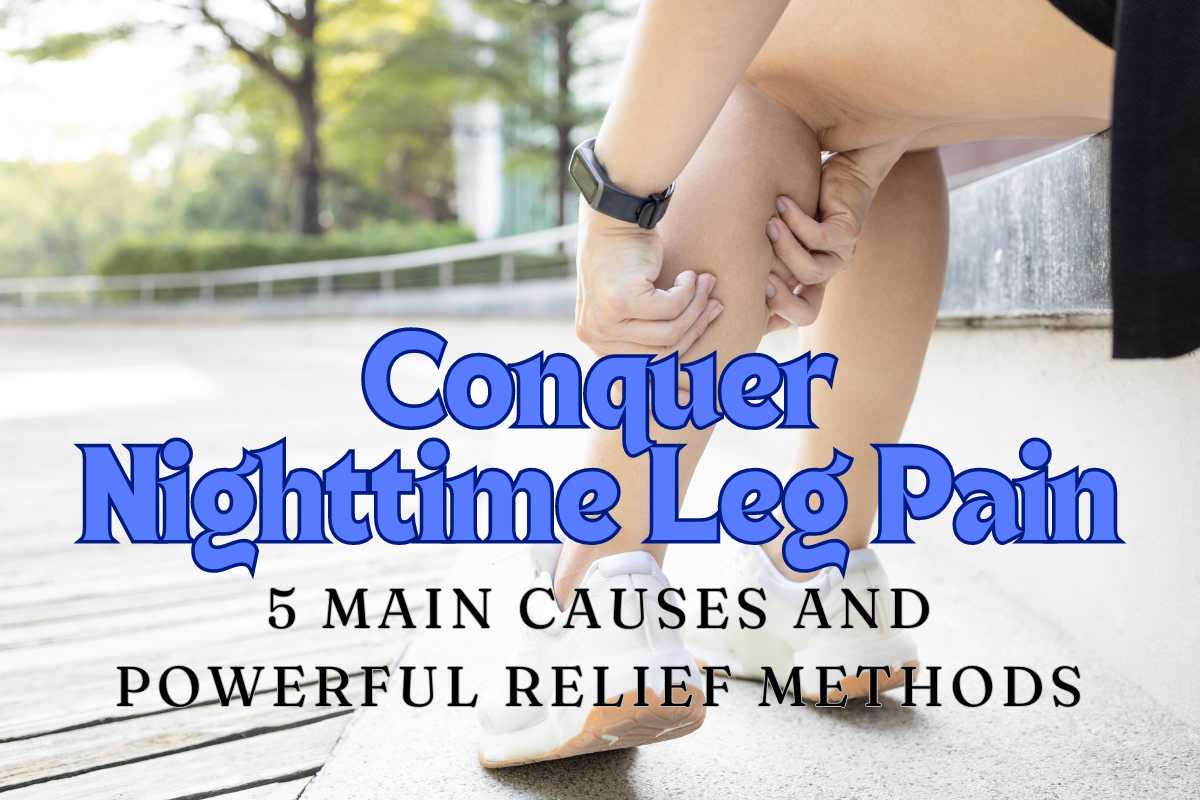Have you ever found yourself lying in bed at night, tossing and turning because your legs are aching? It can be really frustrating and make it difficult to get a good night’s sleep. But have no fear, there are several common reasons why your leg pain at night, ranging from muscle fatigue to restless leg syndrome. By understanding the possible causes of your discomfort, you can take steps to alleviate the pain and finally get some much-needed rest.
Why Do My Legs Ache At Night
Have you ever experienced the discomfort of your legs aching at night? You’re not alone. Many people struggle with this issue, and there are several reasons why your legs might ache when you’re trying to get some rest. Let’s delve into the potential causes and some strategies for finding relief.

Understanding Leg Pain at Night
Leg pain at night can be disruptive to your sleep and overall quality of life. It can manifest as a dull ache, throbbing pain, or even a burning sensation. Understanding the underlying causes of this discomfort is the first step towards finding effective relief.
Causes of Leg Pain at Night
There are several potential reasons why your legs might ache at night. Some common causes include:
- Muscle cramps: Sudden, involuntary contractions of one or more muscles can cause significant pain and discomfort.
- Restless legs syndrome (RLS): A neurological disorder characterized by an irresistible urge to move the legs, often accompanied by uncomfortable sensations.
- Peripheral neuropathy: Damage to the peripheral nerves can lead to symptoms such as numbness, tingling, and pain in the extremities.
- Poor circulation: Reduced blood flow to the legs can result in cramping, pain, and other symptoms.
- Venous insufficiency: When the veins in the legs have difficulty returning blood to the heart, it can lead to pain, swelling, and other issues.
Muscle Cramps: Causes and Solutions
Leg cramps are a common cause of leg pain at night, often occurring in the calves or feet. These sudden, painful contractions can be triggered by dehydration, electrolyte imbalances, muscle fatigue, or other factors.
If you’re experiencing leg cramps at night, try these tips to help prevent and alleviate them:
| Prevention | Treatment |
|---|---|
| Stay hydrated | Stretch the affected muscle |
| Maintain proper nutrition | Apply a warm compress |
| Stretch before bed | Massage the area |
| Address any underlying medical conditions | Use over-the-counter pain relief cream |
Restless Legs Syndrome (RLS): What You Need to Know
Restless Legs Syndrome (RLS) is a neurological disorder that can cause uncomfortable sensations in the legs and an uncontrollable urge to move them to relieve the discomfort. This condition often worsens at night, making it difficult to fall asleep or stay asleep.
If you suspect you have RLS, consider the following strategies to manage your symptoms and improve your sleep:
- Regular exercise: Engaging in physical activity can help alleviate RLS symptoms and improve overall sleep quality.
- Relaxation techniques: Practicing relaxation techniques such as deep breathing or meditation can help calm your mind and body before bed.
- Establish a bedtime routine: Establishing a consistent bedtime routine can signal to your body that it’s time to wind down and prepare for sleep.
- Consult a healthcare provider: If your symptoms persist or worsen, consider seeking professional help to explore treatment options.

Peripheral Neuropathy: Understanding Nerve Damage
Peripheral neuropathy is a condition that occurs when the peripheral nerves become damaged, leading to symptoms such as pain, numbness, tingling, and weakness in the extremities. This condition can affect the legs and feet, causing discomfort that may worsen at night.
If you have peripheral neuropathy, here are some steps you can take to manage your symptoms and improve your quality of life:
- Maintain a healthy lifestyle: Eating a balanced diet, engaging in regular exercise, and managing stress can help improve nerve health and reduce symptoms.
- Manage underlying conditions: If peripheral neuropathy is caused by an underlying medical condition such as diabetes, managing that condition effectively can help alleviate symptoms.
- Wear comfortable shoes: Proper footwear can help prevent foot injuries and reduce pain and discomfort associated with peripheral neuropathy.
- Consider nerve pain medications: In some cases, medications prescribed by a healthcare provider can help manage nerve pain and improve quality of life.

Poor Circulation and Leg Pain: What You Need to Know
Poor circulation can lead to a variety of symptoms, including leg pain, cramping, numbness, and tingling. Inadequate blood flow to the legs can be caused by a range of factors, such as peripheral artery disease, atherosclerosis, or blood clots.
If you suspect you have poor circulation, here are some strategies to improve blood flow and alleviate leg pain:
- Stay active: Regular physical activity can help improve circulation and reduce symptoms of poor circulation.
- Elevate your legs: Elevating your legs above heart level can help promote blood flow and reduce swelling and discomfort.
- Wear compression stockings: Compression stockings can help improve circulation in the legs by applying gentle pressure to support blood flow.
- Avoid sitting or standing for long periods: Prolonged periods of sitting or standing can impair circulation, so be sure to move around regularly and take breaks to stretch and rest your legs.
Venous Insufficiency: Causes and Treatment Options
Venous insufficiency occurs when the veins in the legs have difficulty returning blood to the heart, leading to symptoms such as pain, swelling, heaviness, and skin changes. This condition can be caused by factors such as aging, obesity, inactivity, or genetics.
If you have venous insufficiency, consider the following strategies to manage your symptoms and improve your leg health:
- Wear compression garments: Compression garments such as socks or stockings can help support venous circulation and reduce symptoms.
- Engage in regular exercise: Exercise can help improve circulation, strengthen leg muscles, and reduce symptoms of venous insufficiency.
- Elevate your legs: Elevating your legs above heart level can help reduce swelling and discomfort associated with venous insufficiency.
- Consult a vein specialist: If your symptoms are severe or persistent, consider seeking guidance from a healthcare provider specializing in vein health for personalized treatment options.

Conclusion
Leg pain at night can be a frustrating and uncomfortable experience, but there are ways to address the underlying causes and find relief. By understanding the potential reasons for your discomfort and implementing strategies to manage your symptoms, you can improve your sleep quality and overall well-being. Remember that it’s essential to consult a healthcare provider if your symptoms persist or worsen, as they can provide personalized guidance and treatment options based on your individual needs. Here’s to healthier, happier legs and restful nights ahead.
Related Posts


